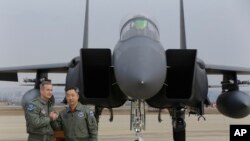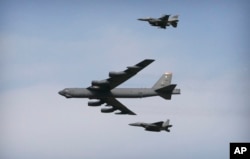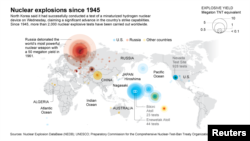A long-range U.S. military bomber flew over South Korea Sunday, in an apparent response to North Korea over its latest nuclear weapons test.
The B-52 bomber, which is capable of carrying nuclear weapons, was seen flying over Osan Air Base, located 72 kilometers south of the border that separates the two Koreas, before heading back to its home base on nearby Guam. The bomber was accompanied by two fighter planes from the U.S. and South Korea.
U.S. Navy Admiral Harry B. Harris, Jr., the commander of the U.S. Pacific Command, issued a statement calling the flight a demonstration of the ironclad U.S. commitment to our allies in South Korea, in Japan, and to the defense of the American homeland."
'Steadfast' in defense of South Korea
Lieutenant-General Terrence O'Shaughnessy, the deputy commander of the joint United States-South Korean military command, told reporters after the flight that the U.S. "remains steadfast" in the defense of South Korea "and to maintaining stability on the Korean Peninsula, to include extended deterrence provided by our conventional forces and our nuclear umbrella."
The U.S. also sent a long-range bomber over South Korea in 2013, shortly after the North carried out its third nuclear test.
South Korea's Yonhap news agency says the United States is considering deploying a nuclear-powered aircraft carrier in the waters off the Korean peninsula.
Kim Jong Un defends nuclear test
Sunday's flight of the B-52 came hours after North Korean leader Kim Jong Un defended last Wednesday's test of an alleged hydrogen bomb as "the legitimate right of a sovereign state and a fair action that nobody can criticize" during a speech to the Ministry of the People's Armed Forces.
In remarks reported Saturday by Pyongyang's official KCNA, Kim said the test was "a self-defensive step for reliably defending" the Korean peninsula from the danger of nuclear war caused by "U.S.-led imperialists."
Two days after the test, Seoul resumed anti-Pyongyang propaganda broadcasts over loudspeakers along the demilitarized border, which Pyongyang considers an act of war. A South Korean military official told Yonhap that the North has retaliated with loudspeaker broadcasts of its own.
North Korea's actions angered traditional ally China and set off a firestorm of criticism in capitals across much of the world.
New UN sanctions
Hours after global sensors detected the blast, the U.N. Security Council met in an emergency session to craft new sanctions against North Korea for its latest violation of U.N. policy. In a statement, the Council said the test posed "a clear threat to international peace and security."
International experts say the test measured as too small to qualify as a full hydrogen bomb test, while political analysts say it may have been designed to draw attention to the reclusive communist state ahead of a rare and crucial meeting of North Korea's ruling Workers' Party.
In his address, Kim also referenced the upcoming congress, noting that the test and the party meeting are just months apart.
The country's 7th party congress, set for May, will be the first such gathering since 1980.
Kim described the congress as "a historic turning point" in accomplishing the country's "revolutionary" ideology.








